Financial and Managerial Accounting Assignment ACC202 Solution
VerifiedAdded on 2022/09/08
|5
|1099
|10
Homework Assignment
AI Summary
This assignment solution addresses key concepts in financial and managerial accounting, specifically focusing on revenue recognition principles, GAAP compliance, and the application of accounting standards. The solution examines scenarios related to revenue recognition for service businesses, the treatment of personal versus business expenses, the importance of full disclosure in financial statements, the application of the historical cost principle, and the objectivity principle in accounting practices. It provides detailed explanations and examples, referencing relevant accounting literature and principles to illustrate the correct application of these concepts. The assignment covers a range of topics, including accrual accounting, asset valuation, and the importance of verifiable and unbiased financial data, offering a comprehensive analysis of accounting principles and their practical implications.
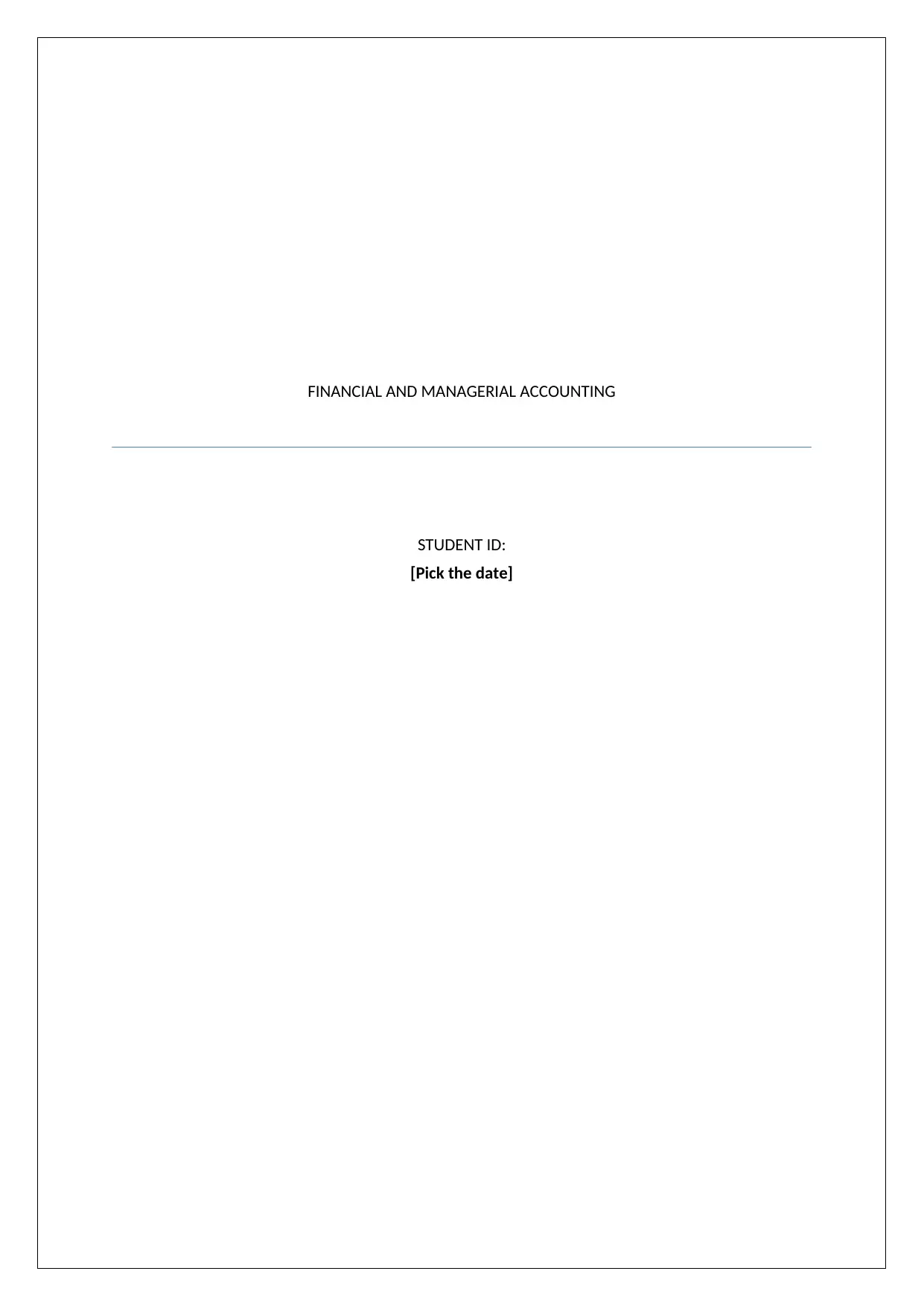
FINANCIAL AND MANAGERIAL ACCOUNTING
STUDENT ID:
[Pick the date]
STUDENT ID:
[Pick the date]
Paraphrase This Document
Need a fresh take? Get an instant paraphrase of this document with our AI Paraphraser
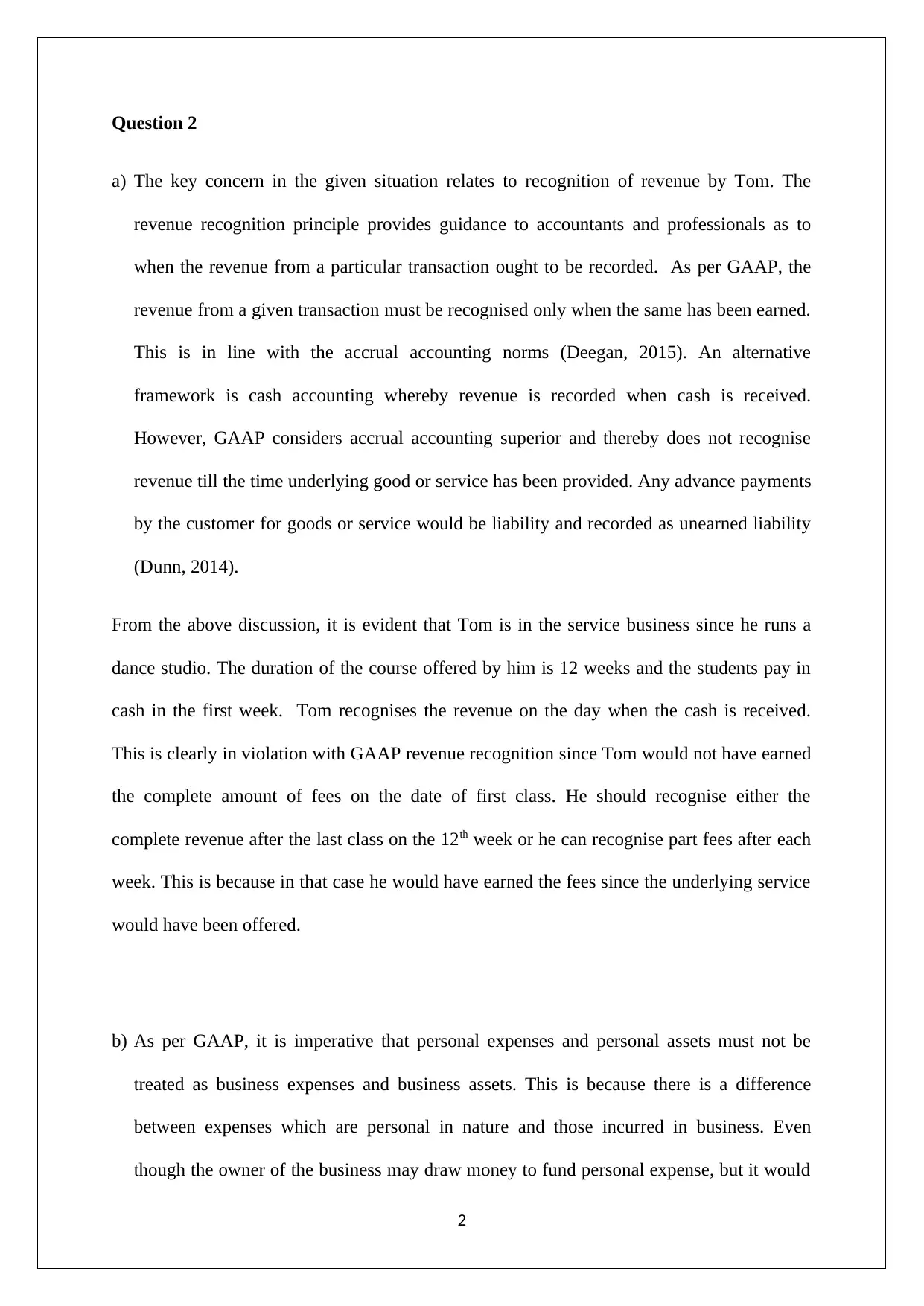
Question 2
a) The key concern in the given situation relates to recognition of revenue by Tom. The
revenue recognition principle provides guidance to accountants and professionals as to
when the revenue from a particular transaction ought to be recorded. As per GAAP, the
revenue from a given transaction must be recognised only when the same has been earned.
This is in line with the accrual accounting norms (Deegan, 2015). An alternative
framework is cash accounting whereby revenue is recorded when cash is received.
However, GAAP considers accrual accounting superior and thereby does not recognise
revenue till the time underlying good or service has been provided. Any advance payments
by the customer for goods or service would be liability and recorded as unearned liability
(Dunn, 2014).
From the above discussion, it is evident that Tom is in the service business since he runs a
dance studio. The duration of the course offered by him is 12 weeks and the students pay in
cash in the first week. Tom recognises the revenue on the day when the cash is received.
This is clearly in violation with GAAP revenue recognition since Tom would not have earned
the complete amount of fees on the date of first class. He should recognise either the
complete revenue after the last class on the 12th week or he can recognise part fees after each
week. This is because in that case he would have earned the fees since the underlying service
would have been offered.
b) As per GAAP, it is imperative that personal expenses and personal assets must not be
treated as business expenses and business assets. This is because there is a difference
between expenses which are personal in nature and those incurred in business. Even
though the owner of the business may draw money to fund personal expense, but it would
2
a) The key concern in the given situation relates to recognition of revenue by Tom. The
revenue recognition principle provides guidance to accountants and professionals as to
when the revenue from a particular transaction ought to be recorded. As per GAAP, the
revenue from a given transaction must be recognised only when the same has been earned.
This is in line with the accrual accounting norms (Deegan, 2015). An alternative
framework is cash accounting whereby revenue is recorded when cash is received.
However, GAAP considers accrual accounting superior and thereby does not recognise
revenue till the time underlying good or service has been provided. Any advance payments
by the customer for goods or service would be liability and recorded as unearned liability
(Dunn, 2014).
From the above discussion, it is evident that Tom is in the service business since he runs a
dance studio. The duration of the course offered by him is 12 weeks and the students pay in
cash in the first week. Tom recognises the revenue on the day when the cash is received.
This is clearly in violation with GAAP revenue recognition since Tom would not have earned
the complete amount of fees on the date of first class. He should recognise either the
complete revenue after the last class on the 12th week or he can recognise part fees after each
week. This is because in that case he would have earned the fees since the underlying service
would have been offered.
b) As per GAAP, it is imperative that personal expenses and personal assets must not be
treated as business expenses and business assets. This is because there is a difference
between expenses which are personal in nature and those incurred in business. Even
though the owner of the business may draw money to fund personal expense, but it would
2
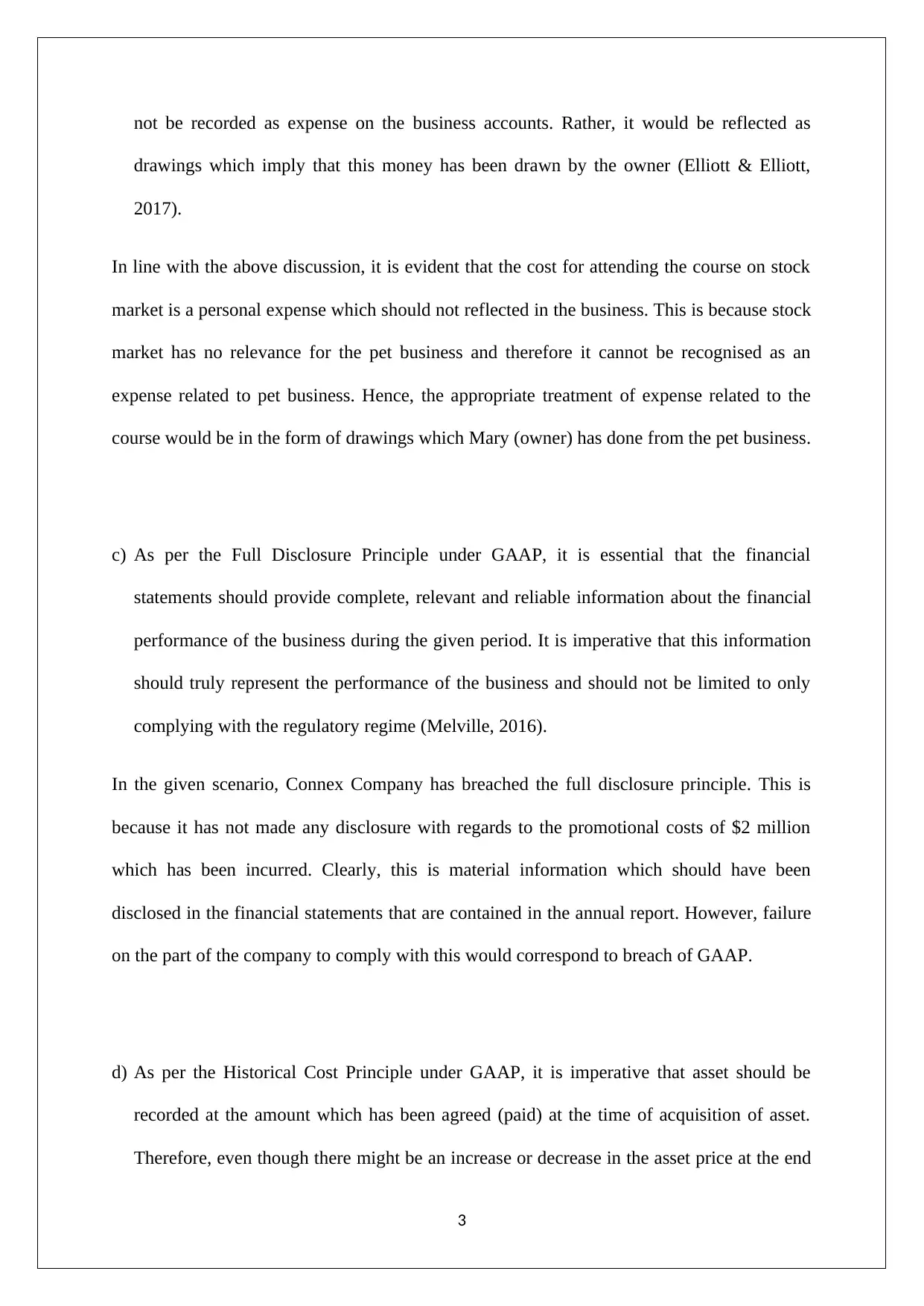
not be recorded as expense on the business accounts. Rather, it would be reflected as
drawings which imply that this money has been drawn by the owner (Elliott & Elliott,
2017).
In line with the above discussion, it is evident that the cost for attending the course on stock
market is a personal expense which should not reflected in the business. This is because stock
market has no relevance for the pet business and therefore it cannot be recognised as an
expense related to pet business. Hence, the appropriate treatment of expense related to the
course would be in the form of drawings which Mary (owner) has done from the pet business.
c) As per the Full Disclosure Principle under GAAP, it is essential that the financial
statements should provide complete, relevant and reliable information about the financial
performance of the business during the given period. It is imperative that this information
should truly represent the performance of the business and should not be limited to only
complying with the regulatory regime (Melville, 2016).
In the given scenario, Connex Company has breached the full disclosure principle. This is
because it has not made any disclosure with regards to the promotional costs of $2 million
which has been incurred. Clearly, this is material information which should have been
disclosed in the financial statements that are contained in the annual report. However, failure
on the part of the company to comply with this would correspond to breach of GAAP.
d) As per the Historical Cost Principle under GAAP, it is imperative that asset should be
recorded at the amount which has been agreed (paid) at the time of acquisition of asset.
Therefore, even though there might be an increase or decrease in the asset price at the end
3
drawings which imply that this money has been drawn by the owner (Elliott & Elliott,
2017).
In line with the above discussion, it is evident that the cost for attending the course on stock
market is a personal expense which should not reflected in the business. This is because stock
market has no relevance for the pet business and therefore it cannot be recognised as an
expense related to pet business. Hence, the appropriate treatment of expense related to the
course would be in the form of drawings which Mary (owner) has done from the pet business.
c) As per the Full Disclosure Principle under GAAP, it is essential that the financial
statements should provide complete, relevant and reliable information about the financial
performance of the business during the given period. It is imperative that this information
should truly represent the performance of the business and should not be limited to only
complying with the regulatory regime (Melville, 2016).
In the given scenario, Connex Company has breached the full disclosure principle. This is
because it has not made any disclosure with regards to the promotional costs of $2 million
which has been incurred. Clearly, this is material information which should have been
disclosed in the financial statements that are contained in the annual report. However, failure
on the part of the company to comply with this would correspond to breach of GAAP.
d) As per the Historical Cost Principle under GAAP, it is imperative that asset should be
recorded at the amount which has been agreed (paid) at the time of acquisition of asset.
Therefore, even though there might be an increase or decrease in the asset price at the end
3
⊘ This is a preview!⊘
Do you want full access?
Subscribe today to unlock all pages.

Trusted by 1+ million students worldwide
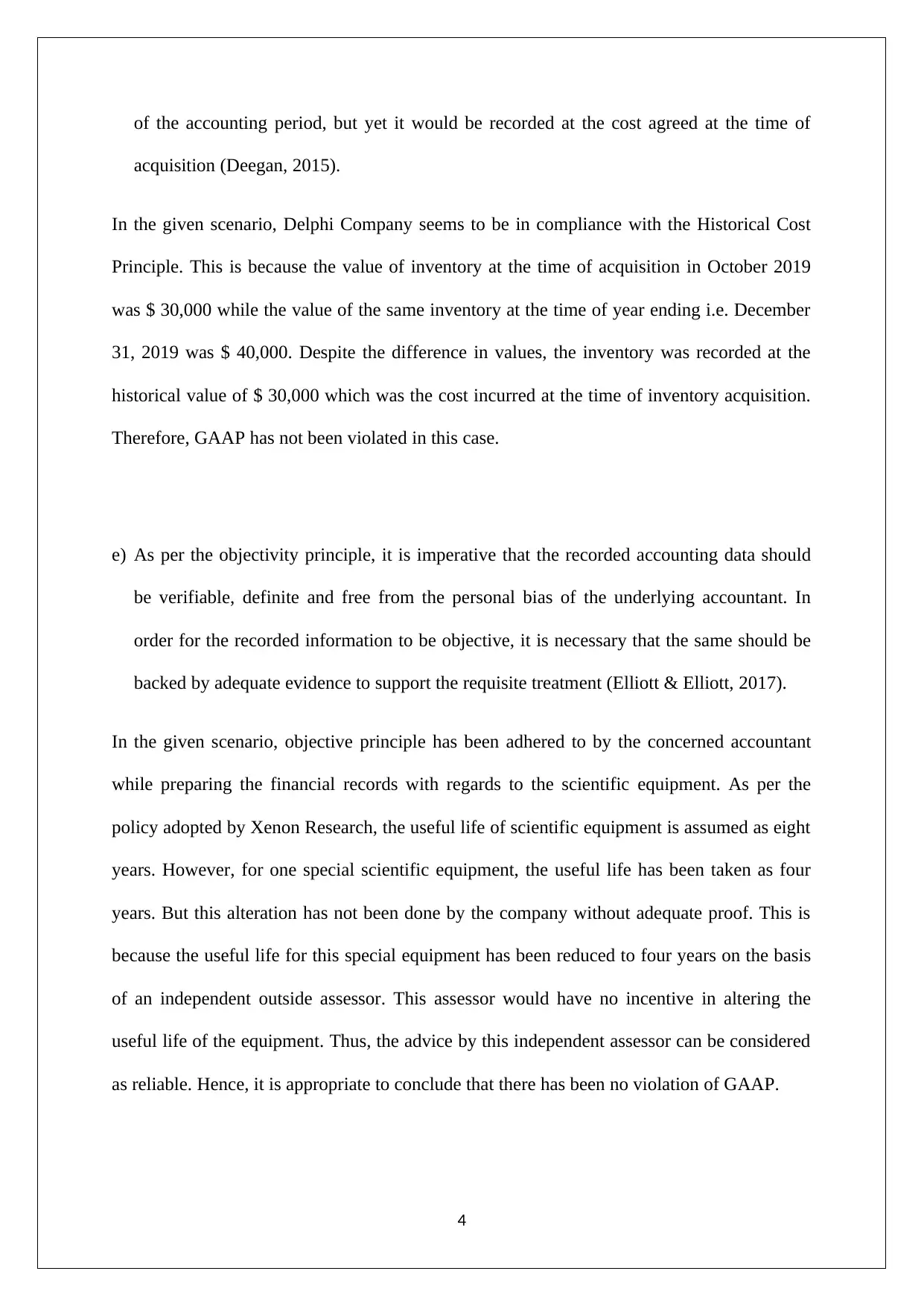
of the accounting period, but yet it would be recorded at the cost agreed at the time of
acquisition (Deegan, 2015).
In the given scenario, Delphi Company seems to be in compliance with the Historical Cost
Principle. This is because the value of inventory at the time of acquisition in October 2019
was $ 30,000 while the value of the same inventory at the time of year ending i.e. December
31, 2019 was $ 40,000. Despite the difference in values, the inventory was recorded at the
historical value of $ 30,000 which was the cost incurred at the time of inventory acquisition.
Therefore, GAAP has not been violated in this case.
e) As per the objectivity principle, it is imperative that the recorded accounting data should
be verifiable, definite and free from the personal bias of the underlying accountant. In
order for the recorded information to be objective, it is necessary that the same should be
backed by adequate evidence to support the requisite treatment (Elliott & Elliott, 2017).
In the given scenario, objective principle has been adhered to by the concerned accountant
while preparing the financial records with regards to the scientific equipment. As per the
policy adopted by Xenon Research, the useful life of scientific equipment is assumed as eight
years. However, for one special scientific equipment, the useful life has been taken as four
years. But this alteration has not been done by the company without adequate proof. This is
because the useful life for this special equipment has been reduced to four years on the basis
of an independent outside assessor. This assessor would have no incentive in altering the
useful life of the equipment. Thus, the advice by this independent assessor can be considered
as reliable. Hence, it is appropriate to conclude that there has been no violation of GAAP.
4
acquisition (Deegan, 2015).
In the given scenario, Delphi Company seems to be in compliance with the Historical Cost
Principle. This is because the value of inventory at the time of acquisition in October 2019
was $ 30,000 while the value of the same inventory at the time of year ending i.e. December
31, 2019 was $ 40,000. Despite the difference in values, the inventory was recorded at the
historical value of $ 30,000 which was the cost incurred at the time of inventory acquisition.
Therefore, GAAP has not been violated in this case.
e) As per the objectivity principle, it is imperative that the recorded accounting data should
be verifiable, definite and free from the personal bias of the underlying accountant. In
order for the recorded information to be objective, it is necessary that the same should be
backed by adequate evidence to support the requisite treatment (Elliott & Elliott, 2017).
In the given scenario, objective principle has been adhered to by the concerned accountant
while preparing the financial records with regards to the scientific equipment. As per the
policy adopted by Xenon Research, the useful life of scientific equipment is assumed as eight
years. However, for one special scientific equipment, the useful life has been taken as four
years. But this alteration has not been done by the company without adequate proof. This is
because the useful life for this special equipment has been reduced to four years on the basis
of an independent outside assessor. This assessor would have no incentive in altering the
useful life of the equipment. Thus, the advice by this independent assessor can be considered
as reliable. Hence, it is appropriate to conclude that there has been no violation of GAAP.
4
Paraphrase This Document
Need a fresh take? Get an instant paraphrase of this document with our AI Paraphraser
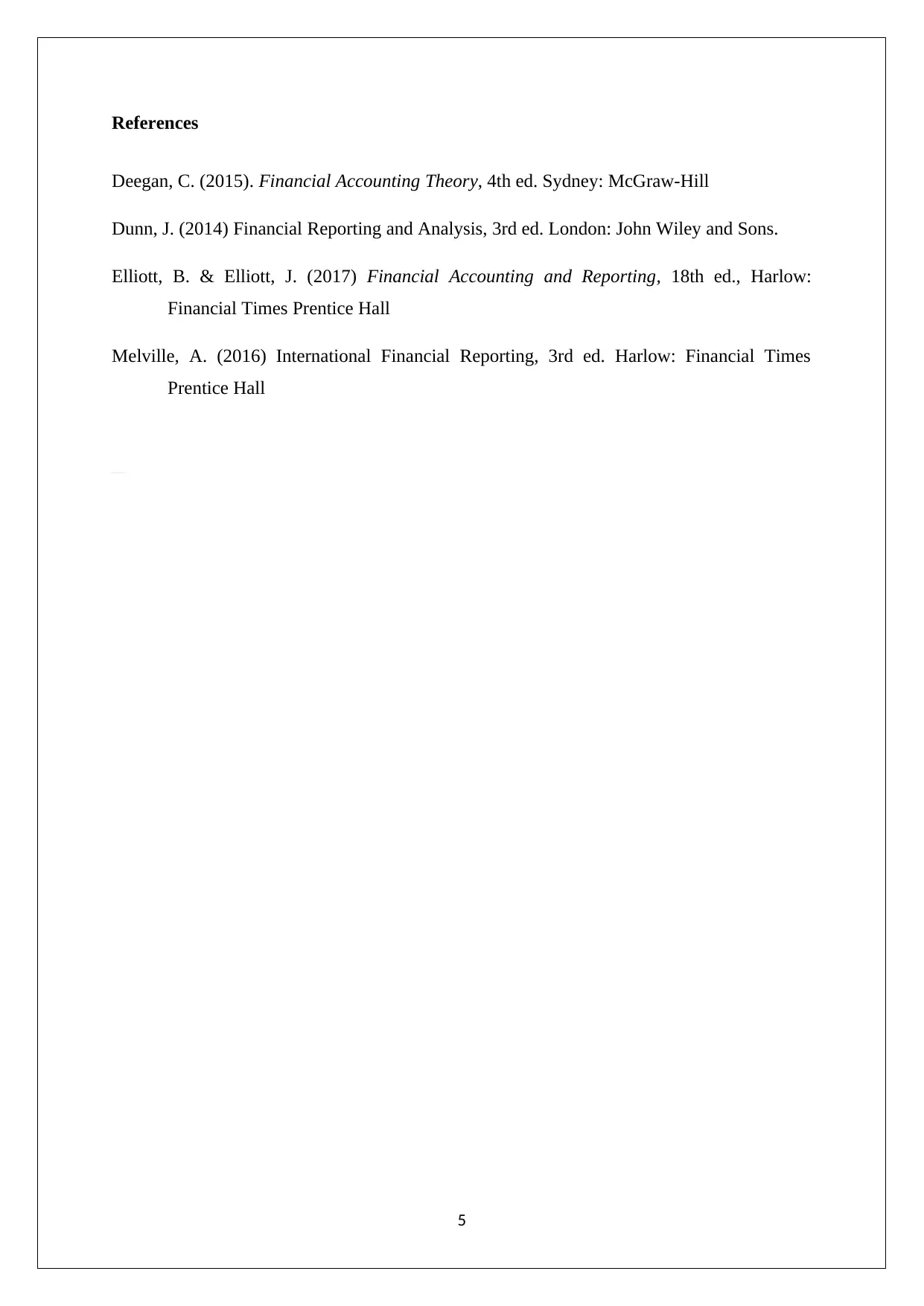
References
Deegan, C. (2015). Financial Accounting Theory, 4th ed. Sydney: McGraw-Hill
Dunn, J. (2014) Financial Reporting and Analysis, 3rd ed. London: John Wiley and Sons.
Elliott, B. & Elliott, J. (2017) Financial Accounting and Reporting, 18th ed., Harlow:
Financial Times Prentice Hall
Melville, A. (2016) International Financial Reporting, 3rd ed. Harlow: Financial Times
Prentice Hall
5
Deegan, C. (2015). Financial Accounting Theory, 4th ed. Sydney: McGraw-Hill
Dunn, J. (2014) Financial Reporting and Analysis, 3rd ed. London: John Wiley and Sons.
Elliott, B. & Elliott, J. (2017) Financial Accounting and Reporting, 18th ed., Harlow:
Financial Times Prentice Hall
Melville, A. (2016) International Financial Reporting, 3rd ed. Harlow: Financial Times
Prentice Hall
5
1 out of 5
Related Documents
Your All-in-One AI-Powered Toolkit for Academic Success.
+13062052269
info@desklib.com
Available 24*7 on WhatsApp / Email
![[object Object]](/_next/static/media/star-bottom.7253800d.svg)
Unlock your academic potential
Copyright © 2020–2025 A2Z Services. All Rights Reserved. Developed and managed by ZUCOL.





